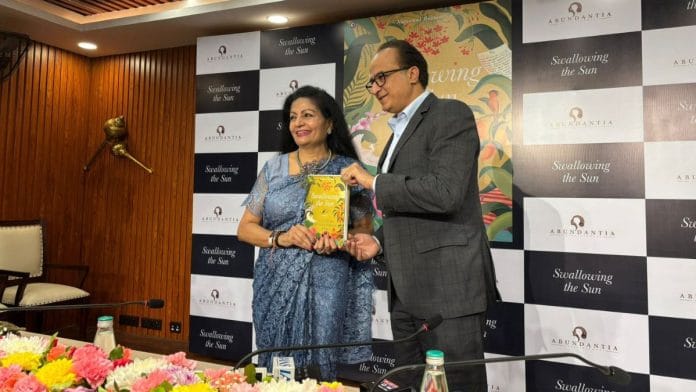New Delhi: In former diplomat Lakshmi Puri’s debut novel, Swallowing the Sun, her protagonist Malti does what few young girls in a pre-Independence village would dare to do. She demands the right to education. This one small act of defiance sets the tone for a story that swells into an epic, spanning family, romance, rebellion, and the fight for freedom.
Barely a year after the book’s release, it is on its way to the screen. Abundantia Entertainment, a Mumbai-based production house behind Bollywood hits like Airlift (2016) and Shakuntala Devi (2020), has acquired the rights to adapt Swallowing the Sun into a web series. For CEO and founder, Vikram Malhotra, the decision was instinctive.
“Swallowing the Sun ticked every box—it was always meant for the screen. The stories weave together the fabric of a nation,” he said.
Malhotra was joined by author Puri at a press conference Monday at the residence of Union petroleum and natural gas minister Hardeep Singh Puri. The beautifully decorated hall was packed with young people, with heavy security.
Building the foundation
The timing for Swallowing the Sun‘s series adaptation couldn’t be better. With streaming services dismantling national barriers, stories like Malati’s can resonate worldwide.
“You can sit in the heart of Jharkhand and watch a show set in Spain or Germany,” Malhotra said. Even within India, linguistic and cultural differences that once divided audiences have collapsed, thanks to dubbing, subtitles, and an increasingly inclusive viewing culture. Audiences are embracing stories from everywhere.
Producers are constantly on the lookout for narratives that represent India while carrying a universal voice. For Malhotra, Swallowing the Sun is one such work. It features loss, longing, and, most importantly, it carries the fabric of India.
“Turning a book into a multiseason web series comes with a set of challenges,” he said. A major challenge when adapting stories set in a different time is research.
When producers create long-form series, they spend months creating the foundation alone.
“[The novel] gives us a head start, though we’ll still conduct in-depth research to stay authentic. It’s about how to transport today’s audiences to that time to make it alive, immediate, and relevant without it feeling like a museum piece,” he said.
Also read: What is a progressive, feminist man really afraid of? A Delhi play explores
Still in early stages
For Lakshmi Puri, a seasoned diplomat and former UN Assistant Secretary General, the book took years to write. Swallowing the Sun takes inspiration from her parents’ lives.
The audience had many questions for both the writer and the producer. Many wondered how the book would be translated for the screen. Would the period setting feel contemporary? Was the story being envisioned as a multi-season saga? Some wanted to know about the casting.
The adaptation is still in the early stages, Malhotra said. A writer’s room is being assembled, and scripting is expected to take at least six to nine months. He added that the casting will be crucial, since the actor will have to embody Malati’s youthful defiance as well as her adult gravitas.
Puri is excited about the adaptation. “I know the cinematic demands differ from literary ones, but I trust Vikram and his team to preserve this spirit, the emotional tone of the book, if I may call it that,” she said, laughing.
As the session neared its end, an audience member hesitantly voiced her frustration with films and shows today.
“I love the book and I miss the kind of cinema my parents grew up with. The poetry and music were part of everyday life. Today, that feels lost,” she said, adding she has stopped watching TV.
Malhotra leaned forward, his voice gentle but firm.
“That’s exactly why we do this. Our audience has to support stories that matter, step into theatres, because we’re here to champion good stories,” he said.
(Edited by Prasanna Bachchhav)






